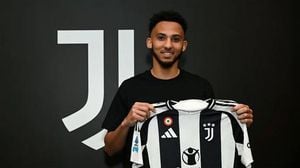Duncan Ferguson, the former striker for Rangers and Everton, has shared a candid account of his tumultuous life experiences, including his time behind bars and his financial struggles, in his new autobiography, "Big Dunc: The Upfront Autobiography." At 53 years old, Ferguson reflects on significant moments that have shaped his life, both on and off the pitch.
One of the most harrowing experiences he recounts is his incarceration in Glasgow’s Barlinnie Prison. In October 1995, Ferguson was sentenced to three months in jail after headbutting an opponent during a match at Ibrox. He vividly describes his first night in prison as the "longest night" of his life, stating, "I believe I’m a brave man, tough physically and mentally. But when I was led handcuffed into HMP Barlinnie on October 11, 1995, my blood ran cold." This moment marked a drastic turn in his life, as he transitioned from a celebrated footballer to a prisoner.
Upon entering Barlinnie, Ferguson was struck by the prison's intimidating atmosphere. He recalled, "I was entering Britain’s most notorious prison with its huge stone walls, barbed wire wound around the top and forbidding metal doors that had all the charm of the brass plate on a coffin." His fears were compounded by the sectarian abuse he faced from fellow inmates. "I’m Protestant, at a Protestant club, Rangers. Being in a prison in Glasgow, with half the joint supporting Celtic, meant sectarianism flowed through Barlinnie like sewage from a broken pipe," he explained.
Despite the fear and anxiety, Ferguson found unexpected support from fellow inmates. He recounted a moment of silence when another inmate intervened, saying, "Shut up, the lot of ya. The next f****r who opens his mouth, he’ll answer to me in the mornin’." This gesture provided some comfort to Ferguson, who spent that night haunted by thoughts of violence. "Welcome to hell," he concluded, capturing the essence of his harrowing experience.
Ferguson's struggles didn't end with his release from prison. In a different chapter of his life, he faced significant financial difficulties that led him to declare bankruptcy. Admitting that he was "never great" with money, Ferguson revealed that poor investments, including film tax schemes, resulted in millions of pounds worth of debt. "Bills and demands were coming through every day," he wrote, describing the humiliation of having to pawn around £1 million worth of jewelry for a fraction of its value and sell properties at a loss.
His financial woes were compounded by a staggering letter from HMRC demanding £4 million. "Can you imagine, a letter demanding £4m?" he asked, reflecting on the stress and shame of his situation. After consulting with a tax expert, Ferguson decided to declare bankruptcy, a move he described as painful: "I’m a proud person and it hurt. At least Janine still had her engagement ring on her finger. Just."
As Ferguson navigates these personal challenges, he remains connected to football, particularly his beloved Everton. Ferguson has expressed a desire to return to management at Everton, where he previously served as caretaker manager. He managed four games during that stint, achieving an average of 1.25 points per game. However, his overall managerial record has raised questions about his readiness for a permanent role. He previously managed Forest Green with a disappointing average of 0.33 points per game and Inverness CT with a slightly better record of 1.27 points per game.
In a recent interview, Ferguson stated, "I want to be on that touchline for Everton. I want to manage Everton. That is my dream…" His passion for the club and its supporters is evident, although he acknowledges the need to build a stronger managerial portfolio. Ferguson has been vocal about the club's need for reinforcements in the upcoming transfer window, particularly regarding the striking position.
With Everton bidding farewell to Goodison Park and preparing for a new chapter at Bramley-Moore Dock, Ferguson emphasized the importance of acquiring a new centre-forward. He noted that the current squad, including Dominic Calvert-Lewin, who has only scored three goals in 23 Premier League appearances, requires significant upgrades. "Absolutely, every single team needs a striker. But where do you get them? How expensive are they going to be?" he asked, highlighting the complexities of the transfer market.
As the club faces potential departures of key players like Calvert-Lewin and Armando Broja, who has not scored in ten appearances, Ferguson's insights underscore the urgency of the situation. "Most of their team is out of contract, so it’s a big rebuild, but certainly up front they need to strengthen," he asserted.
Ferguson's journey has been marked by resilience and a deep love for football, particularly for Everton. His autobiography sheds light on the struggles he has faced, both personally and professionally, while also expressing hope for the future. As he continues to navigate the challenges of life after football, Ferguson's story serves as a testament to the highs and lows that many athletes experience.
With his candid reflections and unwavering passion for the game, Duncan Ferguson remains an enduring figure in the world of football, inspiring both fans and players alike.





